Bode Museum
The Bode-Museum (English: Bode Museum), formerly called the Kaiser-Friedrich-Museum (Emperor Frederick Museum), is a listed building on the Museum Island in the historic centre of Berlin and part of the UNESCO World Heritage. It was built from 1898 to 1904 by order of German Emperor William II according to plans by Ernst von Ihne in Baroque Revival style. The building's front square featured a memorial to German Emperor Frederick III, which was destroyed by the East German authorities.[1] Currently, the Bode-Museum is home to the Skulpturensammlung, the Museum für Byzantinische Kunst and the Münzkabinett.[2]
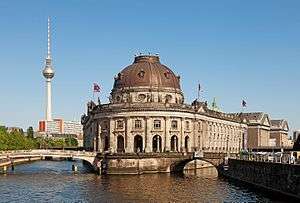 | |
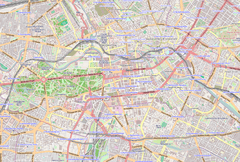 Location within Central Berlin  Bode Museum (Germany) | |
| Location | Museum Island, Berlin |
|---|---|
| Coordinates | 52°31′19″N 13°23′41″E |
| Website | Bode-Museum |
History and collections
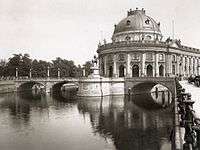
Originally called the Kaiser-Friedrich-Museum after Emperor Frederick III, the museum was renamed in honor of its first curator, Wilhelm von Bode, in 1956.
Closed for repairs since 1997, the museum was reopened on October 18, 2006 after a €156 million refurbishment.[3] True to the ethos of its founding director, Wilhelm von Bode, who believed in mixing art collections,[4] it is now the home for a collection of sculptures, Byzantine art, and coins and medals.[5] The presentation of the collections is both geographic and chronological, with the Byzantine and Gothic art of northern and southern Europe displayed separately on the museum’s first floor and a similar regional division of Renaissance and Baroque art on its second floor.[4]
The sculpture collection displays artwork of the Christian Orient (with an emphasis on Coptic Egypt), sculptures from Byzantium and Ravenna, sculptures of the Middle Ages, the Italian Gothic, and the early Renaissance, including the controversial Flora attributed by Bode to Leonardo da Vinci but now widely argued to be a 19th century work. Late German Gothic works are also represented by Tilman Riemenschneider, the south German Renaissance, and Prussian Baroque art up to the 18th century. In the future selected works of the Gemäldegalerie will be integrated into the sculpture collection. This is reminiscent of William von Bode's concept of "style rooms", in which sculptures, paintings, and crafts are viewed together, as was usual in upper middle-class private collections.
The Münzkabinett ("coin cabinet") is one of the world's largest numismatic collections. Its range spans from the beginning of minting in the 7th century BC in Asia Minor up to the present day. With approximately 500,000 items, the collection is a unique archive for historical research, while its medal collection also makes it an important art exhibition.
Writing in The Financial Times on the occasion on the museum's reopening in 2006, Neil MacGregor, director of the British Museum, hailed “the most comprehensive display of European sculpture anywhere.” He added: “It is no exaggeration to say that in the new Bode Museum, Europe will be able for the first time to read its history — aesthetic and religious, intellectual and political — in a three-dimensional form.”[4]
Canadian gold coin theft
On 27 March 2017, a solid gold coin called the Big Maple Leaf, issued by the Royal Canadian Mint in 2007 as a commemorative piece, was stolen from the museum.[6][7] The coin, at 50 cm in diameter and 2.8 cm in thickness, is made of 24-karat gold and is worth around €3.7 million.[8] A ladder was found on the train tracks nearby, leading German police to speculate that the thief entered the building by breaking open a window in the back of the museum next to the railway tracks.[6][8]
Pop culture
The museum appears as a playable level in the World War II video game Sniper Elite V2.
Gallery
.jpg) At night
At night The entrance hall
The entrance hall The cupola
The cupola Byzantine collection
Byzantine collection Trecento room
Trecento room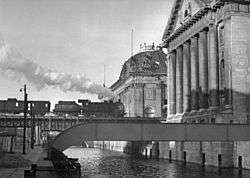 Museum Island with Pergamon Museum and Bode Museum (1951)
Museum Island with Pergamon Museum and Bode Museum (1951)
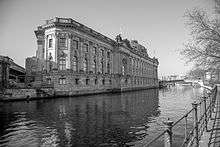
References
- Bodemuseum (Kaiser-Friedrich-Museum) (in German) Landesdenkmalamt Berlin
- Bode-Museum (in English) Staatliche Museen zu Berlin
- "Teuer, billig, im Plan: Berliner Kulturbauten und was sie kosten". Der Tagesspiegel. 17 October 2013.
- Alan Riding (November 27, 2006), German Museums Move Closer to Reunification The New York Times.
- History – Sculpture Collection and Museum of Byzantine Art.
- "Solid gold coin worth $4m stolen from Berlin museum". BBC News. 2017-03-27. Retrieved 2017-03-27.
- Guardian report remembers the theft
- "Giant gold coin worth almost €4 million stolen from Berlin museum in dawn heist". The Telegraph. Retrieved 2017-03-27.
External links
| Wikimedia Commons has media related to Bode-Museum. |
